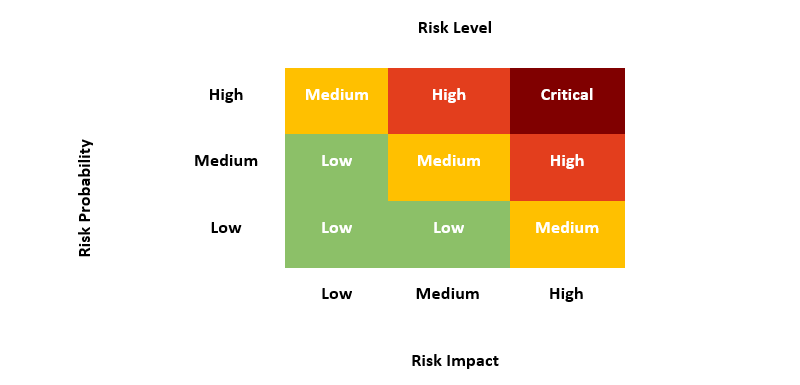Risk Management
Introduction
Risk management is a key part of any project delivery but can, unfortunately get deprioritised or overlooked by managers struggling under the weight of urgent issues and actions requiring attention. But too often project managers forget that a risk is just an issue that has not yet happened. Putting in place a structured risk management approach allows a project manager to proactively deal with these potential issues on his or her terms and to his or her timescales, rather than having to react later with more urgency and the associated fallout. It is a mechanism by which the cycle of reactive urgency can be broken.
Risk management does not need to be complex. There are only a few things to keep in mind. Firstly, identifying the key risks that could impact your project; secondly, assessing the scale and nature of their impact on the project, and finally, ensuring actions are in place to mitigate and avoid them and / or reducing their impact. By following these steps, a project manager can help ensure that a successful project.
In this blog, we will explore the importance of risk management and share key strategies that can help your business navigate the complexities of project’s risks effectively.
The importance of risk management in projects
Effective risk management is crucial to the success of any project, as it helps to identify, assess, and manage potential risks that can threaten the project’s objectives. By doing so, the project manager can ensure timely delivery of the project within budget. Risk management has a considerable importance in the project’s life:
- Minimizes Uncertainty: Risk management identifies risks in advance and provides an opportunity to plan accordingly, reducing uncertainty about project outcomes.
- Ensures Project Success: By thoroughly assessing risks at various stages of the project, the project manager can take preventive and corrective measures to ensure a successful outcome.
- Helps Meet Deadlines: Risks involving time, budget, or resources can cause deadline slippages, leading to project failure. Effective risk management ensures timely delivery of project objectives.
- Improves Quality: Risk management helps identify quality threats and enables project managers to take actions to mitigate those threats, ensuring that the final deliverable meets customer requirements.
- Compliance: Risk management ensures compliance with legal, regulatory and ethical requirements, reducing the risk of legal action against the organization.
How to run risk workshops
Running a risk workshop empowers project members to be more proactive in managing their risks. It helps brainstorm any new risks, categorize the exciting risks by type, probability, and timescale. Also, it helps project stakeholders understand and discuss the assessment of the risks by sharing the mitigation plan and actions. Risk workshops provide an opportunity for the team to give updates on risks on a weekly or monthly basis. By holding regular risk workshops, businesses can ensure that stakeholders are constantly aware of risks and are taking proactive steps to mitigate them.
What happens at risk workshop?
- Brainstorm the risks: Identify collectively any risks that have been overlooked and discuss them with the project stakeholders during the workshop.
- Log the risks: Add the risks that have been identified to the Risk log and evaluate their overall level by estimating their impact and probability (Shown in the table bellow).
- Review the key risks: Reviewing the risk by tracking the contingency or mitigation plan and providing updates from the risk’s owners in every risk workshop.

Contingency planning and proactive management of the risk
First, let us understand the difference between mitigation plan and contingency plan. The Contingency plan is an actionable plan which addresses the risk when it occurs to minimize its negative effect on the project. Any risks identified as high or medium impact should have a contingency plan. The risk manager should provide guidelines for reporting and communication and highlight the measures which the business should take to reduce any damage if the risk happens.
On the other hand, the mitigation plan attempts to minimize the probability of the risk occurring in the first place, avoiding the need to execute a contingency plan. Proactive actions must usually be taken to navigate the project around the risk and prevent it from occurring in the first place. Mitigation actions should, wherever possible, be built into the overall project plan alongside all the activities that need to get done.
Having a structured approach towards risk management plan in place allows the project team to be proactive and take the necessary steps needed to tackle risks before they become issues.
What’s next?
Risk management strategies are important for projects of all sizes. By taking the time to develop and implement a risk management plan, businesses can protect themselves from a variety of potential hazards. Effective risk management involves a systematic and continuous approach, which includes establishing a risk culture, implementing risk mitigation strategies, and encouraging open communication.
Whilst a well-developed risk management plan cannot help avoid every problem, it can certainly reduce the number and impact of them.
If you would like advice or assistance to develop a risk management plan for your project or business and bring urgent issues under control, please contact us. i2a have a team of experienced professionals who can help you identify potential risks and develop strategies to mitigate them. Contact us at info@i2a.co.uk.



Leave A Comment